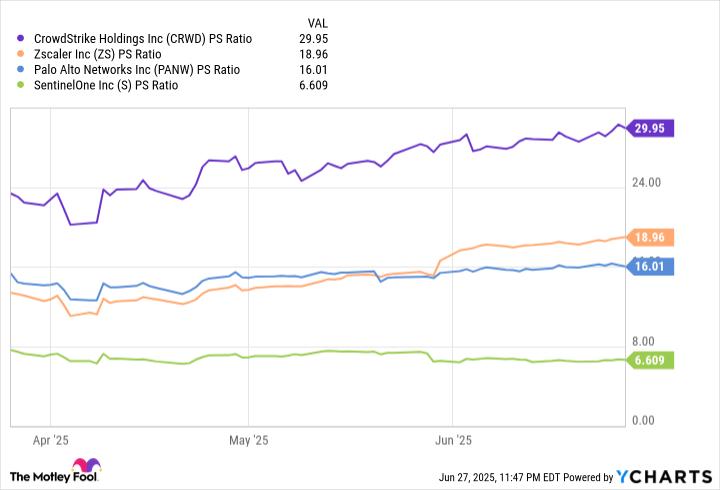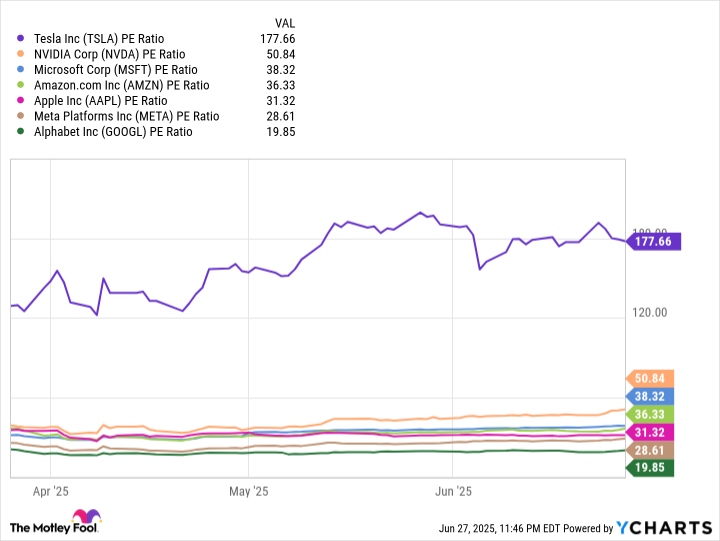AI Insights
2 Artificial Intelligence (AI) Stocks That Could Soar in the Second Half of 2025

The first half of 2025 is officially in the books, and despite the S&P 500 (^GSPC 0.83%) logging a gain of around 5% for the period, it certainly wasn’t smooth sailing for investors. The index was sitting on a year-to-date loss of 15% at its low point in April, after President Donald Trump announced plans to impose tariffs on imported goods from all of America’s trading partners.
Even though the broader market has recovered, some growth stocks like SentinelOne (S 1.74%) and Alphabet (GOOG 0.51%) (GOOGL 0.54%) are still trading in the red for the year. However, a rebound might be in the cards for those two names during the second half of 2025, given the strength of their underlying businesses and their leadership positions in areas like artificial intelligence (AI).
Here’s why SentinelOne and Alphabet might be two great stocks to own in the final six months of this year.
Image source: Getty Images.
The case for SentinelOne
SentinelOne developed an AI-powered cybersecurity platform called Singularity, which offers comprehensive protection for cloud networks, employee identities, endpoints (computers and devices), and more. It autonomously tracks and eliminates threats, and it can even produce detailed summaries of each incident to save human managers from completing hours of manual investigative work.
Purple AI is SentinelOne’s AI-powered virtual assistant that is embedded in Singularity to help employees speed up cybersecurity workflows. But in April, the company launched a new version called Purple AI Athena with expanded capabilities. It’s an AI agent designed to think and reason like a highly experienced human, but at machine speed so it’s far more effective. It learns from security incidents and helps managers set up automated workflows that allow it to remediate similar events in the future.
SentinelOne generated $229 million in total revenue during its fiscal 2026 first quarter (ended April 30). It was a 23% increase from the year-ago period, which was a solid growth rate at face value, except it represented a deceleration from the 29% growth the company delivered in the previous quarter three months earlier. Plus, management actually reduced its full-year forecast for fiscal 2026 by around 1%, to $998.5 million (at the midpoint of the guidance range).
Management cited macroeconomic uncertainties for the downward revision, even though SentinelOne isn’t directly affected by the recent global trade turmoil because it sells digital software products, and penalties like tariffs primarily affect physical imports. However, its customers come from many different industries and if their businesses suffer a slowdown, they might cut their cybersecurity spending.
Fortunately, the majority of Trump’s most aggressive tariffs were rolled back after April, so this might be less of a concern for SentinelOne in the coming quarters. That presents investors with an interesting opportunity, because its stock is still down by 20% this year. Moreover, it’s significantly cheaper than its rivals in the AI-powered cybersecurity space, based on its price-to-sales (P/S) ratio of 6.6:
CRWD PS Ratio data by YCharts
As a result, I think the setup looks great for a potential rebound in SentinelOne stock in the second half of 2025.
The case for Alphabet (Google)
Alphabet is the parent company of Google, YouTube, DeepMind, and self-driving car powerhouse Waymo. The majority of the conglomerate’s revenue comes from the advertising dollars generated by Google Search, but this valuable income stream remains under threat by the growing adoption of AI chatbots, which are stealing traffic from traditional internet search engines.
To combat this, Alphabet launched AI Overviews, which appear above the traditional Google Search results. They combine text, images, and links to third-party sources to answer users’ queries, saving them from having to sift through web pages to find the information they need. Alphabet is hoping this creates enough convenience to stop people from abandoning Google Search, and it seems to be working as planned because at the end of the first quarter of 2025, the company said 1.5 billion people were using Overviews every month.
But Alphabet also used its Gemini family of large language models (LLMs) to launch its own AI chatbot of the same name, so it’s competing with the likes of OpenAI for the attention of users who prefer these tools over traditional search engines. Plus, Alphabet has embedded Gemini into Google Workspace applications like Docs, Sheets, and Gmail, which should prevent users from venturing outside its ecosystem in the hunt for information.
Finally, Google Cloud deserves a special mention because it’s regularly the fastest growing piece of the entire Alphabet conglomerate. Google Cloud operates state-of-the-art data centers filled with AI chips from leading suppliers like Nvidia, and leases the computing capacity to businesses for profit. Plus, its Vertex AI platform offers developers access to more than 200 foundation models (like Gemini) which they can use to accelerate their AI software projects.
Alphabet generated $90.2 billion in total revenue in the first quarter of 2025, which was up 12% from the year-ago period. That included $50.7 billion in Google Search revenue, which grew by 10%, and $12.2 billion in Google Cloud revenue, which was up 28%. The company also delivered $2.81 in earnings per share (EPS), which takes its trailing-12-month EPS to $8.97.
Based on that trailing EPS figure, Alphabet stock is trading at a price-to-earnings (P/E) ratio of just 19.8 as of this writing (June 28), which makes it the cheapest member of an elite group known as the “Magnificent Seven.” These seven companies are at the cutting edge of most segments of the tech industry, including AI:
Alphabet stock is trading at a discount right now because of its ongoing legal battle with the Department of Justice (DOJ), which won a verdict that the conglomerate engages in monopolistic practices. Investors are waiting for the judge to hand down a formal punishment, but the case could be tied up in court for several more years while the appeals process plays out.
However, AI could be the biggest opportunity in Alphabet’s history, so services like Google Cloud and Gemini could be more important to the company’s financial success from here than legacy businesses like Google Search (which is the subject of its legal woes). I think Alphabet’s attractive valuation sets the stage for a strong second half of 2025, as investors turn more of their attention to the success of its AI products and services.
Suzanne Frey, an executive at Alphabet, is a member of The Motley Fool’s board of directors. Randi Zuckerberg, a former director of market development and spokeswoman for Facebook and sister to Meta Platforms CEO Mark Zuckerberg, is a member of The Motley Fool’s board of directors. John Mackey, former CEO of Whole Foods Market, an Amazon subsidiary, is a member of The Motley Fool’s board of directors. Anthony Di Pizio has no position in any of the stocks mentioned. The Motley Fool has positions in and recommends Alphabet, Amazon, CrowdStrike, Meta Platforms, Microsoft, Nvidia, Tesla, and Zscaler. The Motley Fool recommends Palo Alto Networks and recommends the following options: long January 2026 $395 calls on Microsoft and short January 2026 $405 calls on Microsoft. The Motley Fool has a disclosure policy.
AI Insights
To ChatGPT or not to ChatGPT: Professors grapple with AI in the classroom

As shopping period settles, students may notice a new addition to many syllabi: an artificial intelligence policy. As one of his first initiatives as associate provost for artificial intelligence, Michael Littman PhD’96 encouraged professors to implement guidelines for the use of AI.
Littman also recommended that professors “discuss (their) expectations in class” and “think about (their) stance around the use of AI,” he wrote in an Aug. 20 letter to faculty. But, professors on campus have applied this advice in different ways, reflecting the range of attitudes towards AI.
In her nonfiction classes, Associate Teaching Professor of English Kate Schapira MFA’06 prohibits AI usage entirely.
“I teach nonfiction because evidence … clarity and specificity are important to me,” she said. AI threatens these principles at a time “when they are especially culturally devalued” nationally.
She added that an overreliance on AI goes beyond the classroom. “It can get someone fired. It can screw up someone’s medication dosage. It can cause someone to believe that they have justification to harm themselves or another person,” she said.
Nancy Khalek, an associate professor of religious studies and history, said she is intentionally designing assignments that are not suitable for AI usage. Instead, she wants students “to engage in reflective assignments, for which things like ChatGPT and the like are not particularly useful or appropriate.”
Khalek said she considers herself an “AI skeptic” — while she acknowledged the tool’s potential, she expressed opposition to “the anti-human aspects of some of these technologies.”
But AI policies vary within and across departments.
Professors “are really struggling with how to create good AI policies, knowing that AI is here to stay, but also valuing some of the intermediate steps that it takes for a student to gain knowledge,” said Aisling Dugan PhD’07, associate teaching professor of biology.
In her class, BIOL 0530: “Principles of Immunology,” Dugan said she allows students to choose to use artificial intelligence for some assignments, but that she requires students to critique their own AI-generated work.
She said this reflection “is a skill that I think we’ll be using more and more of.”
Dugan added that she thinks AI can serve as a “study buddy” for students. She has been working with her teaching assistants to develop an AI chatbot for her classes, which she hopes will eventually answer student questions and supplement the study videos made by her TAs.
Despite this, Dugan still shared concerns over AI in classrooms. “It kind of misses the mark sometimes,” she said, “so it’s not as good as talking to a scientist.”
For some assignments, like primary literature readings, she has a firm no-AI policy, noting that comprehending primary literature is “a major pedagogical tool in upper-level biology courses.”
“There’s just some things that you have to do yourself,” Dugan said. “It (would be) like trying to learn how to ride a bike from AI.”
Assistant Professor of the Practice of Computer Science Eric Ewing PhD’24 is also trying to strike a balance between how AI can support and inhibit student learning.
This semester, his courses, CSCI 0410: “Foundations of AI and Machine Learning” and CSCI 1470: “Deep Learning,” heavily focus on artificial intelligence. He said assignments are no longer “measuring the same things,” since “we know students are using AI.”
While he does not allow students to use AI on homework, his classes offer projects that allow them “full rein” use of AI. This way, he said, “students are hopefully still getting exposure to these tools, but also meeting our learning objectives.”
Get The Herald delivered to your inbox daily.
Ewing also added that the skills required of graduated students are shifting — the growing presence of AI in the professional world requires a different toolkit.
He believes students in upper level computer science classes should be allowed to use AI in their coding assignments. “If you don’t use AI at the moment, you’re behind everybody else who’s using it,” he said.
Ewing says that he identifies AI policy violations through code similarity — last semester, he found that 25 students had similarly structured code. Ultimately, 22 of those 25 admitted to AI usage.
Littman also provided guidance to professors on how to identify the dishonest use of AI, noting various detection tools.
“I personally don’t trust any of these tools,” Littman said. In his introductory letter, he also advised faculty not to be “overly reliant on automated detection tools.”
Although she does not use detection tools, Schapira provides specific reasons in her syllabi to not use AI in order to convince students to comply with her policy.
“If you’re in this class because you want to get better at writing — whatever “better” means to you — those tools won’t help you learn that,” her syllabus reads. “It wastes water and energy, pollutes heavily, is vulnerable to inaccuracies and amplifies bias.”
In addition to these environmental concerns, Dugan was also concerned about the ethical implications of AI technology.
Khalek also expressed her concerns “about the increasingly documented mental health effects of tools like ChatGPT and other LLM-based apps.” In her course, she discussed with students how engaging with AI can “resonate emotionally and linguistically, and thus impact our sense of self in a profound way.”
Students in Schapira’s class can also present “collective demands” if they find the structure of her course overwhelming. “The solution to the problem of too much to do is not to use an AI tool. That means you’re doing nothing. It’s to change your conditions and situations with the people around you,” she said.
“There are ways to not need (AI),” Schapira continued. “Because of the flaws that (it has) and because of the damage (it) can do, I think finding those ways is worth it.”
AI Insights
This Artificial Intelligence (AI) Stock Could Outperform Nvidia by 2030

When investors think about artificial intelligence (AI) and the chips powering this technology, one company tends to dominate the conversation: Nvidia (NASDAQ: NVDA). It has become an undisputed barometer for AI adoption, riding the wave with its industry-leading GPUs and the sticky ecosystem of its CUDA software that keep developers in its orbit. Since the launch of ChatGPT about three years ago, Nvidia stock has surged nearly tenfold.
Here’s the twist: While Nvidia commands the spotlight today, it may be Taiwan Semiconductor Manufacturing (NYSE: TSM) that holds the real keys to growth as we look toward the next decade. Below, I’ll unpack why Taiwan Semi — or TSMC, as it’s often called — isn’t just riding the AI wave, but rather is building the foundation that brings the industry to life.
What makes Taiwan Semi so critical is its role as the backbone of the semiconductor ecosystem. Its foundry operations serve as the lifeblood of the industry, transforming complex chip designs into the physical processors that power myriad generative AI applications.
Source Fool.com
AI Insights
Albania puts AI-created ‘minister’ in charge of public procurement | Albania

A digital assistant that helps people navigate government services online has become the first “virtually created” AI cabinet minister and put in charge of public procurement in an attempt to cut down on corruption, the Albanian prime minister has said.
Diella, which means Sun in Albanian, has been advising users on the state’s e-Albania portal since January, helping them through voice commands with the full range of bureaucratic tasks they need to perform in order to access about 95% of citizen services digitally.
“Diella, the first cabinet member who is not physically present, but has been virtually created by AI”, would help make Albania “a country where public tenders are 100% free of corruption”, Edi Rama said on Thursday.
Announcing the makeup of his fourth consecutive government at the ruling Socialist party conference in Tirana, Rama said Diella, who on the e-Albania portal is dressed in traditional Albanian costume, would become “the servant of public procurement”.
Responsibility for deciding the winners of public tenders would be removed from government ministries in a “step-by-step” process and handled by artificial intelligence to ensure “all public spending in the tender process is 100% clear”, he said.
Diella would examine every tender in which the government contracts private companies and objectively assess the merits of each, said Rama, who was re-elected in May and has previously said he sees AI as a potentially effective anti-corruption tool that would eliminate bribes, threats and conflicts of interest.
Public tenders have long been a source of corruption scandals in Albania, which experts say is a hub for international gangs seeking to launder money from trafficking drugs and weapons and where graft has extended into the upper reaches of government.
Albanian media praised the move as “a major transformation in the way the Albanian government conceives and exercises administrative power, introducing technology not only as a tool, but also as an active participant in governance”.
after newsletter promotion
Not everyone was convinced, however. “In Albania, even Diella will be corrupted,” commented one Facebook user.
-

 Business2 weeks ago
Business2 weeks agoThe Guardian view on Trump and the Fed: independence is no substitute for accountability | Editorial
-
Tools & Platforms1 month ago
Building Trust in Military AI Starts with Opening the Black Box – War on the Rocks
-

 Ethics & Policy2 months ago
Ethics & Policy2 months agoSDAIA Supports Saudi Arabia’s Leadership in Shaping Global AI Ethics, Policy, and Research – وكالة الأنباء السعودية
-

 Events & Conferences4 months ago
Events & Conferences4 months agoJourney to 1000 models: Scaling Instagram’s recommendation system
-

 Jobs & Careers2 months ago
Jobs & Careers2 months agoMumbai-based Perplexity Alternative Has 60k+ Users Without Funding
-

 Podcasts & Talks2 months ago
Podcasts & Talks2 months agoHappy 4th of July! 🎆 Made with Veo 3 in Gemini
-

 Education2 months ago
Education2 months agoMacron says UK and France have duty to tackle illegal migration ‘with humanity, solidarity and firmness’ – UK politics live | Politics
-

 Education2 months ago
Education2 months agoVEX Robotics launches AI-powered classroom robotics system
-

 Funding & Business2 months ago
Funding & Business2 months agoKayak and Expedia race to build AI travel agents that turn social posts into itineraries
-

 Podcasts & Talks2 months ago
Podcasts & Talks2 months agoOpenAI 🤝 @teamganassi



